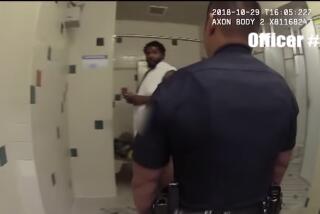2nd Appeal Denied in Murder of Woman
- Share via
SAN FRANCISCO — The state Supreme Court rejected Armenia Cudjo’s attempt six years ago to blame his brother for the murder of a woman in the Antelope Valley and was no more receptive Monday to an attempt to pin the capital crime on the victim’s husband.
A 6-1 ruling rejected a defense claim that Cudjo’s trial lawyer should have done more to investigate statements by a neighbor and a building contractor suggesting that Amelia Prokuda’s husband, Ubaldo, was responsible for her fatal beating in March 1986.
The court said the trial lawyer was unable to find one of the witnesses--even though his address was in an investigator’s report--and reasonably concluded the husband was an unlikely suspect after sheriff’s officers checked out his alibi.
The justices had voted 5-2 in 1993 to uphold Cudjo’s conviction and death sentence. The main issue in that appeal was Superior Court Judge Howard Schwab’s refusal to let the jury hear from an inmate who quoted Cudjo’s brother, Gregory, as confessing.
Monday’s ruling rejected a request for a new trial based on a claim of incompetent legal representation.
Prokuda’s partially clad body was found in the bedroom of her home in the desert community of Littlerock. A bloodstained hammer and a broken fireplace poker were nearby.
Her son, Kevin, who was 5 at the time, testified at the trial two years later that a man he didn’t recognize had entered the house, held a knife to his mother’s neck and demanded money. He said the man later tied her up and took two guns from a closet. His description of the man resembled Gregory Cudjo more than his brother, the court said in the 1993 ruling.
The verdict would have been no different if jurors had heard about Gregory Cudjo’s purported jailhouse confession, because the inmate was a friend of Armenia Cudjo, the confession conflicted with some of the evidence and the prosecution’s case was strong, the court said in 1993.
Justice Joyce Kennard dissented from that ruling but wrote Monday’s majority opinion that found Cudjo’s trial lawyer, William Clark, acted reasonably by cutting short an investigation of the victim’s husband and offering no evidence that he was the killer.
The husband’s employer and other witnesses backed his statement that he had left work around the time of the killing, made several stops and arrived home more than four hours later, Kennard said.
More to Read
Sign up for Essential California
The most important California stories and recommendations in your inbox every morning.
You may occasionally receive promotional content from the Los Angeles Times.













